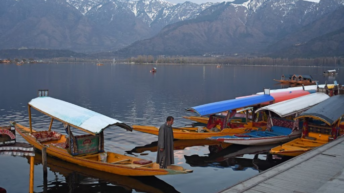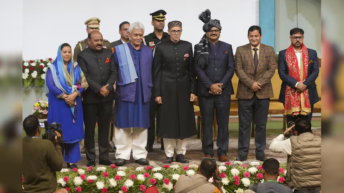|
Listen to article
Getting your Trinity Audio player ready...
|

The recent spurt in the killings of civilians in the Kashmir Valley is not a random act of violence but a well thought out strategy by Pakistan’s intelligence agency, the ISI, to continue to fuel terrorism in the Union Territory (UT). The killings may be random but the act has a deeper purpose of spreading fear among the minority Hindu population and forcing once again, a mass exodus of this minuscule group. The message being given by the terrorists is clear: leave the UT or be killed. In terms of optics, an exodus now will be reminiscent of what happened earlier to this hapless Hindu population in Kashmir in 1991 and will be viewed as a failure of the Centre in bringing about normalcy post the abrogation of the Special Provisions of Article 370. On the ground, through ethnic cleansing, the terrorist groups and their Pakistani sponsors intend to keep the valley on the boil, in furtherance of their aim to create an Islamic caliphate in Kashmir, which would be a step towards their ultimate goal of Ghazwa-e-Hind.
Paradoxically, this revision in strategy by the Pakistani deep state is a result of the success achieved in moving swiftly towards the total integration of the state, post the abrogation of the provisions of Article 370 by the Indian Parliament on 5 June 2019. Since the abrogation, terrorism in the UT has nosedived considerably, with normalcy returning to large parts of the Valley. Local body elections have been successfully conducted and the delimitation exercise has been completed. Tourism has picked up despite the lingering fears of Covid-19— the Wuhan virus. The first five months of this year have already seen more arrivals than the 6.6 lakh tourists that visited Kashmir in 2021, and all hotels in Kashmir are filled to capacity. The number of terrorists being killed every month remains high, while the casualties suffered by the security forces have gone down. It is these disproportionate losses being suffered by terrorist groups and the swift manner in which Kashmir was returning to normalcy that has unnerved their sponsors in Pakistan and prompted a shift in their strategy to targeting the minority Hindu community. So how should India respond to this challenge?
There are just about 5000 Kashmiri Hindus employed by the government who are currently working in Kashmir. In addition, over one lakh people from other parts of India are working as labour in the Valley. Providing security to each individual is physically impossible, but during the high level review meeting held by India’s Home Minister, Mr. Amit Shah on 3 June, future actions to be taken to counter the threat were discussed. This included providing security to the migrant Hindu labour as well as to Kashmiri Hindus by concentrating them in clusters, which would facilitate protection. But it would be naive to presume that a problem which has been festering for decades can be quickly resolved, especially as it involves de-radicalising a population which has been exposed to an insidious ideology for two to three generations. It is a work in progress that requires sustained action over a period of time.
The current approach to tackling terrorism in J&K is holistic, encompassing political, diplomatic, military and administrative initiatives. This has worked well in bringing a large semblance of normalcy to the state, but the fact remains that a society so deeply radicalised over two to three generations will take time to revert to normalcy. The UT has also been caught off guard by the change in tactics being employed by terrorist groups, wherein they are using young Kashmiris who have no earlier criminal record, in random killings of innocent Hindus. The capacity of the terror groups to strike at such soft targets was perhaps underestimated.
As a long-term measure to combat terrorism, it would be important to impose further deterrents on Pakistan to force that country to stop using terrorism as an instrument of its foreign policy. It is also important to address the issue of radicalisation which has seeped into a large segment of Kashmiri Muslims. An important step towards this end would be an acknowledgment that what Kashmir has faced over the last few decades is not a movement for ‘Azadi’, but an attempt to create an Islamic State. Only then will policies be focused on countering this hateful ideology among Kashmir’s Muslims. These would include keeping a check on what is taught to school children in schools and madrassas, and what is preached by the clerics in mosques.
The return of the Kashmiri Hindus to their homeland must also be taken up on priority. For these individuals to go back to their original homes is presently fraught with danger. It may be advisable then, to resettle them in one or two areas, where appropriate security measures can be put in place. In addition, as and when elections are held in the UT and a new government is installed, the genocide that the Kashmiri Hindus were subjected to must be publicly acknowledged and the perpetrators made to stand trial, regardless of the time that has elapsed since then. Such an act will bring about the process of healing which will bode well for the future of all Kashmiris. The Kashmiri Hindus must also be compensated for the loss they have suffered.
As an immediate measure, it is vital to instill in the minority population, a sense of confidence in the ability of the administration to protect their lives and property. Simultaneously, it is important to impose a deterrent to the terrorists and to their sympathisers and supporters which will make them desist from carrying out such attacks in the future. All such offences must legally be non-bailable. In addition, all individuals providing support to terrorists should be deprived of all elements of state support such as subsidised ration and other facilities as also employment in government jobs. They must be debarred from standing in elections at all levels and must be made to surrender their passports. Terrorists who are killed must not be allowed a funeral. Their remains must be burnt and the ashes disposed off. Their property must be confiscated by the state and sold and the proceeds given to the victims of terror. Property of individuals apprehended on terror charges or for supporting terror activities must also be confiscated and disposed off in like manner.
The administration also needs to be revamped, especially at the lower levels. Many individuals in the police, education, revenue and other administrative departments are beholden to Geelani of the Hurriyat Conference for their jobs. They remain compromised in their loyalty to the country. Such individuals need to be weeded out in a phased manner.
Finally, it is for the Kashmiri Muslims to rise against terrorism. They have been exploited long enough and they need to break the shackles which their clergy and regional political parties have confined them. Only with concerted action by all concerned can the scourge of terrorism be permanently erased from the face of this region.






Very well written article within the confine of politically correct stance . To stop further radicalisation close madarsas and run govt funded school with common curriculum. All Friday prayers should be under CCTV of nearest police station and any inflammatory speech should be ruthlessly dealt with . Present situation demand aggressive counter like raising colonies of rehabilitated Kashmiri and giving plot & accommodation to those who can defend themselves. All crime perpetrators should be taken to logical conclusion by fast track courts. Little hope as government is not capable of handling pressure of even innocent counter religious commment if Nupur sharma . These type of weakness encourage terrorists.
The Hindu Community must be provided Arms Training and be given small weapons for self defence as it may not be possible to provide security to all.Secondly we must carry out precision bombing in POK to send a clear message to Pakistan that they have to mend their way.Thirdly the so called Gupkar gang must be motivated to issue warning to the general public not to resort to Innocent Hindu killing.We cannot have another exodus.All people picking up Arms against the state should be treated as terrorists.The term OGW should not be used at all.Stop giving all subsidises.They do not deserve it.All those wanting to go to Pakistan should be given a free passage.We have to be proactive and not reactive at all.
In addition, there is a need to strengthen our intelligence network in a major way using all means – especially electronic (targeting cell phones, cyber identification of computers used to send messages as each has its own footprint and use of women intelligence officers). Further, reducing the number of frequencies that allow voice transmission (to enable tighter control on monitoring) besides some out of the box methods e.g enhancing visits of medical teams with quasi intelligence personnel being part of the team with basic medical knowledge). Also, all intelligence personnel must know the local language etc and must go through a stringent selection process with an eye on their families as well. Cell phone monitoring will be most productive.
As always very well analysed by Maj Gen Dhruv Katoch. Completely agree with the solutions, except that priority should be given to harsher policing and military measures, for as long as it takes. No need to look for immediate political mileage on every small achievement. Also the community not just within Kashmir but all across the country should be motivated to denounce the activities of radical elements. The political sympathisers should be ghettoised. Also religious teachers need to be tested and watched and maddarsa teaching be regulated.